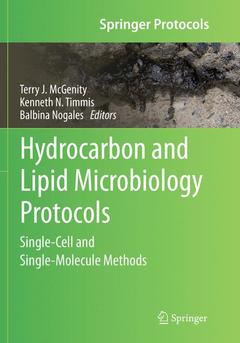Hydrocarbon and Lipid Microbiology Protocols, Softcover reprint of the original 1st ed. 2016 Single-Cell and Single-Molecule Methods Springer Protocols Handbooks Series
Langue : Anglais

This Volume presents relevant single-cell and single-molecule approaches in the study of microbes producing and utilizing hydrocarbons and lipids. While generically applicable for all microorganisms, the approaches described are, wherever possible, adapted to the field of study of hydrocarbon and lipid microbiology. The methods include basic procedures for isolating single cells by means of microfluidics and flow cytometry, and their cultivation in arrays as pure clones; for isolating, amplifying and sequencing single-cell genomes and transcriptomes; and for analysing single-cell metabolomes by means of Raman spectroscopy. Single-molecule approaches include the use of protein:fluorescent dye fusions for protein localization and methods for the production of cell division protostructures and lipid monolayers. Methods for the functional analysis of single cells include detection of metabolically active (protein-synthesizing) cells in environmental samples by bioorthogonal non-canonical amino acid tagging, Raman spectroscopy combined with stable isotope labelling and fluorescent in situ hybridisation, and visualization of single cells participating in gene transfer activity. Lastly, protocols are presented for single-cell biotechnological applications, including biofuel production.
Hydrocarbon and Lipid Microbiology Protocols
There are tens of thousands of structurally different hydrocarbons, hydrocarbon derivatives and lipids, and a wide array of these molecules are required for cells to function. The global hydrocarbon cycle, which is largely driven by microorganisms, has a major impact on our environment and climate. Microbes are responsible for cleaning up the environmental pollution caused by the exploitation of hydrocarbon reservoirs and will also be pivotal in reducing our reliance on fossil fuels by providing biofuels, plastics and industrial chemicals. Gaining an understanding of the relevant functions of the wide range of microbes that produce, consume and modify hydrocarbons and related compounds will be key to responding to these challenges. This comprehensive collection of current and emerging protocols will facilitate acquisition of this understanding and exploitation of useful activities of such microbes.
Introduction: Single cell biotechnology for uncultured microorganisms.- Single-cell cultivation in microfluidic devices.- Single-cell bacterial bioreporter assays to measure hydrocarbons.- Whole genome amplification of single bacterial cells.- Detection of specific mRNA molecules in hydrocarbon-degrading bacteria.- Localisation of proteins within intact bacterial cells using fluorescent protein fusions.- Raman-FISH.- Single-cell metabolomics.- Marrying single molecules to single cells: Protocols for the study of the bacterial proto-ring components essential for division.- Single cell biotechnology for uncultured microorganisms.- Single cell and systems biology tools for biofuel production.- Detection of protein-synthesizing microorganisms in the environment via bioorthogonal non-canonical amino acid tagging (BONCAT).- Flow cytometric determination of microbial abundances and its use to obtain indices of community structure and relative activity.- Protocols for visualizing horizontal gene transfer in Gram-negative bacteria through natural competence.
Offers readily reproducible, step-by-step laboratory methods Provides helpful tips and tricks to complement the protocols Includes troubleshooting advice Features practical laboratory guidelines to promote successful results
Date de parution : 04-2018
Ouvrage de 204 p.
17.8x25.4 cm
Date de parution : 04-2016
Ouvrage de 204 p.
17.8x25.4 cm
Thèmes de Hydrocarbon and Lipid Microbiology Protocols :
© 2024 LAVOISIER S.A.S.



